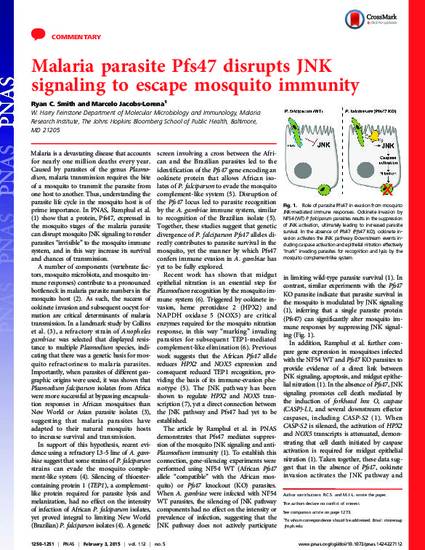
Article
Malaria parasite Pfs47 disrupts JNK signaling to escape mosquito immunity
Proceedings of the National Academy of Sciences of the United States of America
(2015)
Abstract
Malaria is a devastating disease that accounts for nearly one million deaths every year. Caused by parasites of the genus Plasmodium, malaria transmission requires the bite of a mosquito to transmit the parasite from one host to another. Thus, understanding the parasite life cycle in the mosquito host is of prime importance. In PNAS, Ramphul et al. (1) show that a protein, Pfs47, expressed in the mosquito stages of the malaria parasite can disrupt mosquito JNK signaling to render parasites “invisible” to the mosquito immune system, and in this way increase its survival and chances of transmission.
A number of components (vertebrate factors, mosquito microbiota, and mosquito immune responses) contribute to a pronounced bottleneck in malaria parasite numbers in the mosquito host (2). As such, the success of ookinete invasion and subsequent oocyst formation are critical determinants of malaria transmission. In a landmark study by Collins et al. (3), a refractory strain of Anopheles gambiae was selected that displayed resistance to multiple Plasmodium species, indicating that there was a genetic basis for mosquito refractoriness to malaria parasites. Importantly, when parasites of different geographic origins were used, it was shown that Plasmodium falciparum isolates from Africa were more successful at bypassing encapsulation responses in African mosquitoes than New World or Asian parasite isolates (3), suggesting that malaria parasites have adapted to their natural mosquito hosts to increase survival and transmission.
Disciplines
Publication Date
2015
DOI
10.1073/pnas.1424227112
Publisher Statement
Copyright PNAS 2015
Citation Information
Ryan C. Smith and Marcelo Jacobs-Lorena. "Malaria parasite Pfs47 disrupts JNK signaling to escape mosquito immunity" Proceedings of the National Academy of Sciences of the United States of America Vol. 112 Iss. 5 (2015) p. 1250 - 1251 Available at: http://works.bepress.com/ryan_smith1/15/
